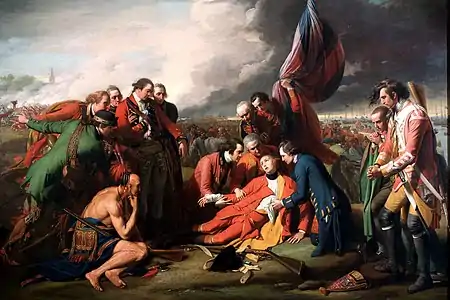| |||||
| Decades: |
| ||||
|---|---|---|---|---|---|
| See also: | |||||
| Part of a series on the |
| History of Canada |
|---|
 |
| Timeline (list) |
| Historically significant |
| Topics |
| By provinces and territories |
| Cities |
| Research |
Events from the year 1865 in Canada.
Incumbents
Crown
Federal government
Governors
- Governor General of the Province of Canada — Charles Monck, 4th Viscount Monck
- Colonial Governor of Newfoundland — Anthony Musgrave
- Governor of New Brunswick — Arthur Charles Hamilton-Gordon
- Governor of Nova Scotia — Charles Hastings Doyle then Richard Graves MacDonnell then Sir William Fenwick Williams
- Governor of Prince Edward Island — George Dundas
Premiers
- Joint Premiers of the Province of Canada –
- John Alexander Macdonald, Canada West Premier
- Étienne-Paschal Taché then Narcisse-Fortunat Belleau, Canada East Premier
- Premier of Newfoundland — Hugh Hoyles then Frederick Carter
- Premiers of New Brunswick — Samuel Leonard Tilley then Albert James Smith
- Premiers of Nova Scotia – Charles Tupper
- Premier of Prince Edward Island – John Hamilton Gray then James Colledge Pope
Events
- February 3 – Legislature approves message to Crown for union of British North America provinces.
- February 20 – The Legislature of the Province of Canada passes a motion in favour of Confederation.
- March 7 – New Brunswick rejects a Confederation scheme.
- March 24 – Macdonald, Brown, Cartier, and Galt appointed to negotiate Confederation in London.
- May 9 – American Civil War ends
- May 10 – An Admiralty letter to the Colonial Office required colonial warships to "wear a Union Jack in the usual place, and the White Ensign, with either the Arms of the Colony, or such other distinguishing mark as may be chosen by the Colony, and approved by the Colonial Office and the Lords Commissioners of the Admiralty". This regulation was mainly directed at Australia and not applicable to Canada, which had no Navy at that time.
- October 20 – Proclamation of Ottawa as seat of government.
- November 7 – 1865 Newfoundland general election
- December 16 – A distinctive Blue Ensign for the province of Canada is authorized by the UK secretary of state for the colonies.
- December 22 – Colonial Office Circular notifying revised Admiralty requirements for flags for colonial warships and for other colonial government vessels and requesting correct drawings of seals or badges to be adopted as distinguishing marks.
Births
- January 7[2] – Lyman Duff, jurist and Chief Justice of Canada (died 1955)
- February 10 – Richard Gardiner Willis, politician (died 1929)
- February 28 – Wilfred Grenfell, medical missionary (died 1940)
- March 15 – Edith Maude Eaton, author (died 1914)
- April 10 – Jack Miner, conservationist (died 1944)
- May 31 – Clarence Chant, astronomer and physicist (died 1956)
- July 16 – George Bowlby, physician and surgeon, military officer, and mayor of Berlin, Ontario (died 1916)
- August 10 – James Wilson Morrice, painter (died 1924)
- November 17 – John Stanley Plaskett, astronomer (died 1941)
- December 25 – James Breakey, politician (died 1952)
- December 30 — Emily Julian McManus poet, author, and educator (died 1918)
Full date unknown
- James Endicott, church leader and missionary (died 1954)
Deaths
- January 16 – Joseph Cunard, merchant, shipbuilder and politician (born 1799)
- July 27 – Augustin-Norbert Morin, lawyer, judge, politician and Joint Premier of the Province of Canada (born 1803)
- July 30 – Étienne-Paschal Taché, doctor, politician, and deputy adjutant-general of the militia (born 1795)
- August 27 – Thomas Chandler Haliburton, author, judge and politician (born 1796)
Historical documents
Confederation Canada must be aware of might of United States [3]
U.S. Congress resolves to withdraw from treaty limiting navies on Great Lakes[4]
Powerful British MP Benjamin Disraeli says Britain would be foolish to lose Canada [5]
U.S. ambassador reports British seem less defensive [6]
Governor General orders flags flown at half-mast following President Lincoln's assassination[7]
Arrest on U.S.A.-bound Canadian ship of man ready to kill "Yankees" [8]
Province of Canada law requires prostitutes available to sailors and soldiers to report for medical inspection if summoned[9]
References
- ↑ "Queen Victoria | The Canadian Encyclopedia". www.thecanadianencyclopedia.ca. Retrieved 5 December 2022.
- ↑ "The Right Honourable Sir Lyman Poore Duff, P.C., G.C.M.G." Supreme Court of Canada. Archived from the original on 2015-06-06. Retrieved 26 April 2015.
- ↑ "The British-American Confederation" The Illustrated London News (February 4, 1865), The Civil War in America from The Illustrated London News. Accessed 20 September 2018
- ↑ United States Department of State, "Thirty-Eighth Congress, Second Session. Joint Resolution..." Papers Relating to Foreign Affairs, Accompanying the Annual Message of the President to the First Session Thirty-Ninth Congress (1865), pg. 164. Accessed 9 September 2018
- ↑ "Foreign News; Europe" Harper's Weekly; A Journal of Civilization, Vol. IX, Issue 432 (April 8, 1865), pg. 211. Accessed 9 September 2018
- ↑ United States Department of State, "Mr. Adams to Mr. Seward" Papers Relating to Foreign Affairs, Accompanying the Annual Message of the President to the First Session Thirty-Ninth Congress (1865), pg. 262. Accessed 9 September 2018
- ↑ United States Department of State, "Lord Monck to Sir F. Bruce" Executive Documents Printed by Order of the House of Representatives, during the First Session of the Thirty-Ninth Congress, 1865-'66 (1865-1866), pg. 184. Accessed 9 September 2018
- ↑ "The Case of the Georgian" Northern Advance, Barrie, C.W. (April 26, 1865). Accessed 15 September 2018
- ↑ "An Act for the prevention of contagious diseases at certain Naval and Military Stations in this Province" No. 220, 4th Session, 8th Parliament (September 4, 1865). Accessed 12 April 2021
This article is issued from Wikipedia. The text is licensed under Creative Commons - Attribution - Sharealike. Additional terms may apply for the media files.